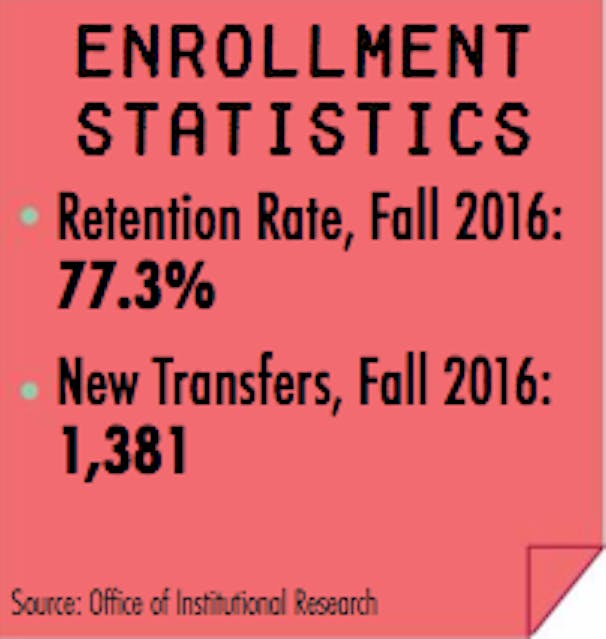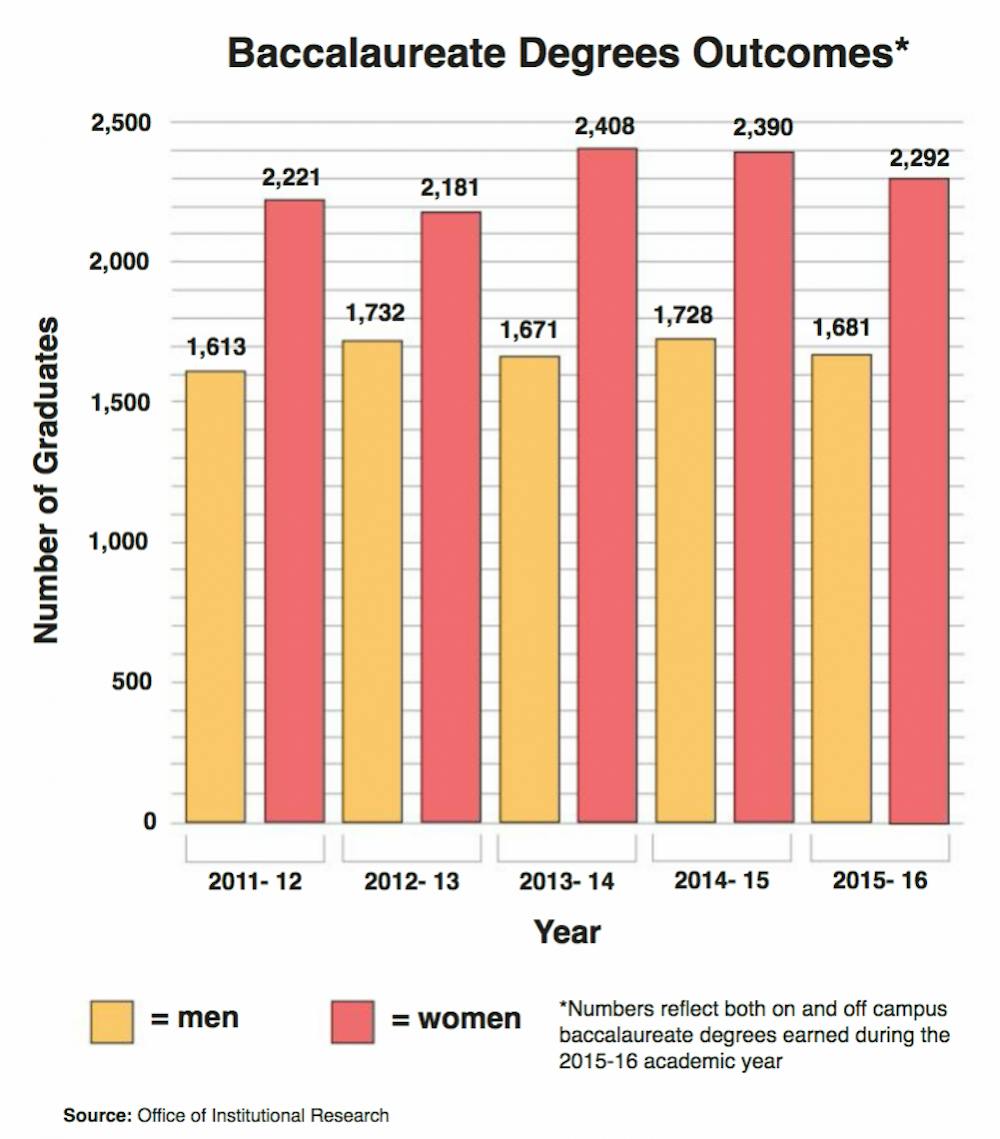Central Michigan University looks to adjust graduation requirements to 120-credits, help students save money and graduate faster
For many undergraduate students, 124 is the goal — the number of credit hours needed to graduate from Central Michigan University with a bachelor’s degree.
What that 124 comprises is hard to nail down.
Outside the core competencies and the required 24 to 27 credit hours in university program courses — the IA, IIB, IVC and so on — students will typically have some discrepancies when comparing needed courses to complete their majors or minors.
Students need a minimum number of 300 level or above courses.
Students will only need to earn 120 credits — possibly as soon as Fall 2018 for some degree programs — due to a decision made in June by the CMU Board of Trustees.
Students need to have earned at least 30 of their 124 credits from CMU.
And now, students will only need to earn 120 credits — possibly as soon as Fall 2018 for some degree programs.
"A full (course) load is considered to be 15 credits a semester, which is equivalent to 120 credits

over four years,” said Ian Davison, senior vice provost of the Academic Reorganization Initiative and dean of the College of Science and Engineering.
The goal of lowering the credit requirement is to expedite student graduation rates, lower the cost of attending CMU and streamline the number of courses students can reasonably take in a semester.
For Davison, this means making it so students can graduate in four years by taking 15 credit hours a semester. It may also mean an end to trying to squeeze in an extra four credits via summer courses, online classes or overloading on classes for a semester.
“Reducing the credits students actually complete by graduation will shorten the time to graduation and decrease the cost of a CMU education,” Davison said. “Doing so is likely to require a variety of approaches with the change to 120 credits representing the first small step.”
A new standard
The switch from 124 to 120 credit hours was approved by the Board of Trustees during their June meeting, spurred by imperatives outlined in the 2022 Strategic Plan, “Advancing Academic Excellence.”
The plan was approved in June by the Board of Trustees and focuses on three imperatives: Nurturing student success, fostering scholarly activity and strengthening partnerships both in and out of state between the university and outside sources.
This includes alumni, other communities, corporations, government agencies and nonprofit organizations.
Claudia Douglass, vice provost for academic effectiveness, plays a large role in leading the change which she said is largely focused on “nurturing student success.”
The new number, 120, is the minimum number of credit hours a student can take to earn a degree as required by the Higher Learning Commission, she said.
“We’re looking at this as a way to move student success forward,” Douglass said. “One of the goals is to help students graduate in four years and reducing the number of required credits. This helps us get to that end.”

Of the 16 degree programs offered, 13 require 124 as the base amount of credits to graduate. The remainder require at least 130 credits.
Certain programs, however, will not benefit from the reduction such as accredited programs that require more than 120 credit hours to maintain the program’s status.
For degree programs that can be cut, Douglass said the idea is to trim from electives and modify a curriculum to streamline the learning process. This could involve making three separate courses into one catch-all course and updating what students are learning to meet industry standards in their respective job fields.
This also helps CMU fall in line with other universities also at a 120-credit hour standard for graduation. These institutions include Ball State University, Illinois State University and Ohio University.
Other institutions like Western Michigan University and Bowling Green State University have 122-credit hour minimums, compared to Miami University-Oxford which has a 128-credit hour minimum.
Barrie Wilkes, vice president of finance and administrative services, said money did not play a part in the decision to change the credit hour standard. He does not have an estimate for revenue gained or lost by the base reduction in credit hours.
For the fall 2017 semester, tuition costs $417 per credit hour, meaning a little more than $1,600 per student could be lost by the university depending on if students capitalize on the credit reduction.
“The financial impact will depend on the actual number of credits that students take,” Wilkes said. “Many will still take more than the minimum number of 120.”
Some programs have already undergone a review, including the Bachelor of Arts, Bachelor of Science, Bachelor of Applied Arts and the Bachelor of Individualized Studies.
According to University Communications, those degrees have been discussed by a number of committees within the Academic Senate and are en route to receive additional modification alongside the credit hour reduction.
These changes will be discussed at an Academic Senate meeting later this semester, which Douglass said students would benefit by attending.
Student feedback
Andrea Machniak chose CMU because of the options it offered her when she was unsure of the major she wanted to pursue.
Now a therapeutic recreation major, the Adrian sophomore said she doesn’t believe the credit change will affect her due to the amount of credits she already holds academically.
“It’s hard just trying to get out in four years and graduate, because you have to get all of your prerequisites in,” Machniak said. “Just trying to smush them all together so you can get out in four years can get kind of frustrating.”
For others, she wonders if the reduction in credit hours might be viewed as degrading. Machniak said while reducing credits might save money, students could look at it as though their degree is worth less than what they could have received at another institution.
As the eighth person in her family to attend CMU, Mount Pleasant junior Jaclyn Prout views the

change as a positive. Prout believes it should allow her to graduate in May of her senior year rather than the fall afterward, which she initially planned for.
After changing her major to English, Prout said her credit requirements for graduation changed as well, which set her back from graduating in four years. This change could put her back on track.
Prout will still be taking classes in the summer, but the number of classes could be reduced if her degree program ends up being one of the few revised by fall 2018. She credits a lot of this, getting back on track and possibly graduating on time, to academic advisers around campus.
“Even now, two years after I changed my major completely and had taken nothing in regard to my (new) English major, the advisers here have really helped me so that I’m still going to graduate within the next two years,” she said. “If (administration decides to) cut the four credit hours, and I took six credit hours this summer, I would actually be graduating in May of my senior year.”
Douglass said stories like Prout’s are the motivation to implement the changes as soon as they can be moved through the Academic Senate and approved by the Board of Trustees.
“One of the most common complaints we hear from students is they’re having to be (at CMU) one extra semester or a ninth semester,” Douglass said. “Although reducing the number of required credit hours by four saves some tuition money, more than that graduating in an even four years saves (money on) housing and puts students into the job market in a much more appropriate length of time.”
Regardless when the switch is implemented for degree programs, Mendon junior Logan Slaughter said the switch should be seen as a positive for all students even if it doesn’t directly affect their credit climb toward graduation.
Slaughter, who’s on the offensive line for CMU’s football team, said playing for the Chippewas was a large reason for coming to the university. While he’s grateful for the opportunity to play, football is also one of the biggest difficulties when trying to plan for classes — namely, with scheduling around practices.
“I’ve had a lot of difficulty with some classes that might only have one (time slot) and it’s during practice, so I have to try and reschedule and take a different class, or find a different semester,” Slaughter said. “It does cause a lot of problems for me especially.”
If he could say anything to university administration in regards to implementing the credit change in a timely manner, Slaughter said it would be a simple message — just do it.
“It would be very beneficial to any kind of student, because not only would it save us money, but being able to get us out into the real world faster would also be very beneficial as well,” he said. “I feel like (the university has) done an excellent job of preparing me for life after graduation and the different opportunities (CMU) gives you to be in the classroom or putting you out there in the real world is really beneficial for any kind of student.”
Contributions to this article were made by News Editor Mitchell Kukulka.




